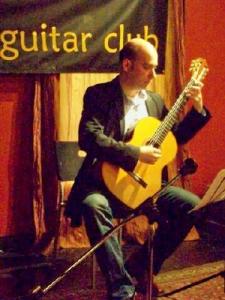Matthew Ardizzone, DMA Presents: Total Recall-"Harnessing the Power of the Mind to Enjoy Playing by Heart," May 17 at Abilene's
♪ Among guitar people I know, one of the biggest headaches (maybe after fingernail problems!) is memory, the difficulties in memorizing pieces, and what can be done to expedite the process. This past Monday, Matthew Ardizzone visited us at Abilene to share his experience in this area, with special focus on classical music scores, but applicable to all genres.

One of his first suggestions was the reminder that the memorization of classical scores is a relative newcomer. In Mozart’s time, for example, not having music on the stand was by far the gauche exception. Schumann was one of the first composers to play without notation, guiding the way, and this was considered both novel and revolutionary.
We probably all know reasons for keeping a score in front of us—it boosts confidence, ensures against “getting lost” or having memory lapses, provides reminders of expressive marks, key changes, and other technical information. What case can be made for leaving that trusted score in the guitar case? Playing without a score encourages flexibility, enjoyment, the ability to improvise/adapt to other players. This is what can be called “playing from the heart.”
Matt quoted some interesting science regarding how memory is made and altered: According to Daniel Coyle in The Talent Code, the myelin wrapping of our nerve cell connections strengthen as we repeat actions and encourages us to do things in the same way again and again. (this figures strongly in why a mistake learned on the first reading is so hard to fix, also why multiple sclerosis, a disease of demyelization, is such a tragedy) When we unlearn a mistake, what we actually have to do is create a new memory path. We never really get rid of the old one; we just take a detour away from it.
Matt shared some memory information, such as the fact that the brain responds to novelty, as well as processes like conducting and singing or moving to the music coupled with study and analysis of the same music. There were additional tips on memorizing musical units rather than measures and memorizing several starting points to avoid that usual hazard of knowing the beginning and faltering with the end. These with other suggestions plus a list of the literature resources going into this evening’s talk were included in a handout which he passed around.
Matt made numerous apologies for not taking a lot of time to play during this presentation, alluding to duties that have intruded on his practice time, but an immaculate tone was notable in those instances when he did demonstrate on the guitar. He has promised to come back again and play for us on his Robert Ruck guitar.
—Deb Ross
Photos: Jim Doyle
Share this page: ![]() Facebook
Facebook
![]() Del.icio.us
Del.icio.us
![]() StumbleUpon
StumbleUpon
![]() Digg
Digg
![]() Reddit
Reddit
Home ::
About Us ::
Events ::
Articles ::
Resources ::
Contact Us ::
Links
©2007-2008, Rochester Guitar Club, All Rights Reserved, This page last updated 2011-03-31 20:22:09
Website by Red Beagle Web Development.








